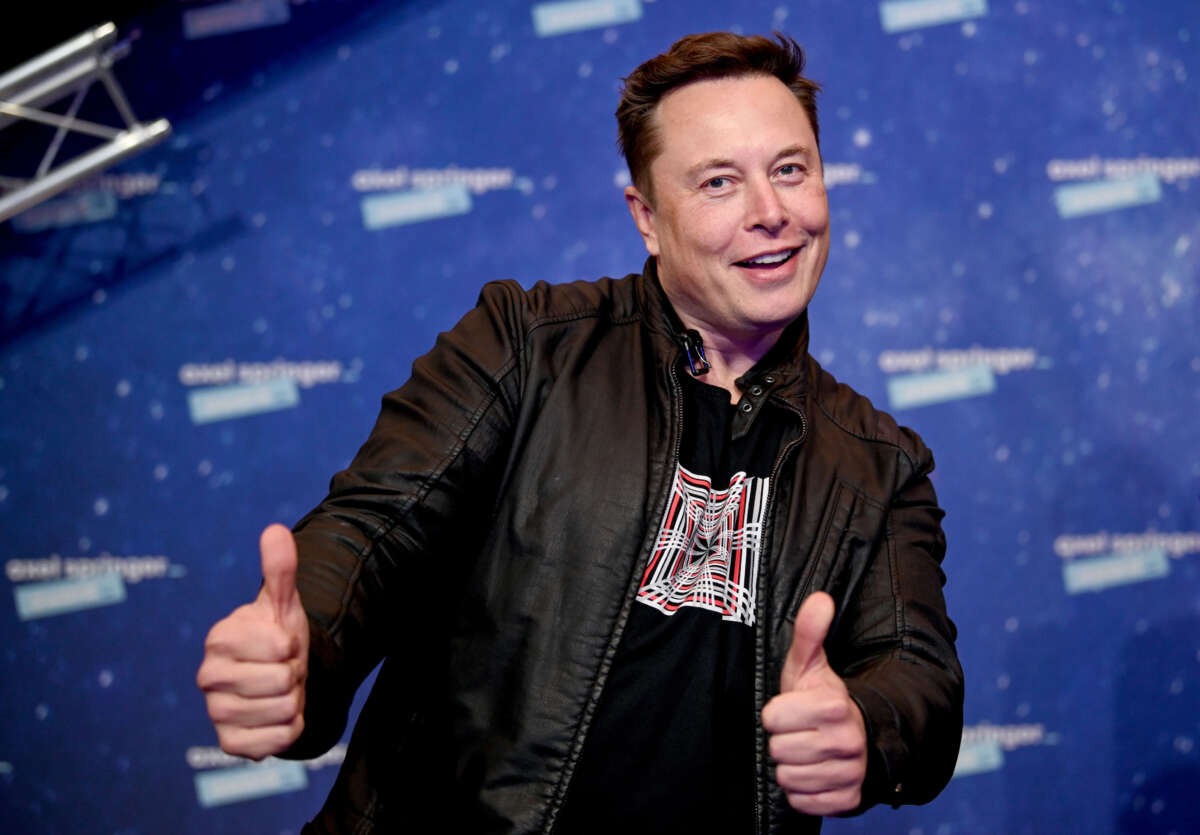Recently uncovered financial documents reveal that last year, as Elon Musk was taunting the United Nations over his choice to withhold $6 billion that he said he would donate to solve world hunger, the right-wing billionaire gave the money to a different source: his own foundation.
Late last year, Musk donated roughly $5.7 billion worth of Tesla shares, as many wealthy people do through donor-advised funds to avoid paying capital gains and income taxes. The recipient of that donation was unknown until this week, when Bloomberg revealed that a tax filing shows that the donation went to the Musk Foundation, “instantly making it one of the largest foundations in the U.S.,” as Bloomberg reported.
The donation came as Musk was stirring up controversy online, arguing with Senators Bernie Sanders (I-Vermont) and Elizabeth Warren (D-Massachusetts) over the fact that billionaires are severely under-taxed in comparison to the general public.
Just a couple of weeks before that, Musk had pledged the money to another cause. In late October, director of the United Nations World Food Program (WFP) David Beasley pointed out that billionaires like Musk could donate just a fraction of their wealth, which has skyrocketed during the pandemic, to address world hunger.
In response, Musk tweeted in a reply to a misleading tweet about Beasley’s remark that he would donate $6 billion — just 2 percent of his net worth at the time — if the UN could prove that the money would solve world hunger, ignoring that Beasley never mentioned solving world hunger altogether with that amount of money.
“If WFP can describe on this Twitter thread exactly how $6B will solve world hunger, I will sell Tesla stock right now and do it,” Musk said.
The WFP took Musk up on his challenge and issued a report just three days later detailing how it could use the funds to feed 42 million of the people across the world who were most at risk of starvation for a year. Of course, the money from Musk, who is notorious for pledging to do good with his money and influence and then backing out, never materialized — not for the WFP, anyway.
Instead, the money went to the Musk Foundation, which appears to be set up in a way that is similar to other foundations started by billionaires; essentially, the sole purpose of these foundations is allowing the rich to dodge taxes while painting themselves as charitable.
Such foundations often sit on large amounts of money while charities wait for donations to arrive; indeed, even though the Musk Foundation had about $9.4 billion in assets by the end of last year, it gave only $160 million to charities in 2021. Similarly, the largest foundation in the U.S., the Bill and Melinda Gates Foundation — which is by no means innocent of tax-dodging schemes itself — had assets worth $55 billion at the end of 2021 while distributing $6.2 billion in grants, according to a foundation spokesperson.
Around the same time last year, Musk sold billions of dollars worth of Tesla stock. While he posted a poll on Twitter asking whether or not he should sell the stock, pretending that he was merely listening to the public, journalists and experts have noted that he likely sold the stock to help meet billions of dollars of tax obligations that had the potential to increase if he put them off, or for other stock-related reasons that he likely ultimately profited from.
We’re not backing down in the face of Trump’s threats.
As Donald Trump is inaugurated a second time, independent media organizations are faced with urgent mandates: Tell the truth more loudly than ever before. Do that work even as our standard modes of distribution (such as social media platforms) are being manipulated and curtailed by forces of fascist repression and ruthless capitalism. Do that work even as journalism and journalists face targeted attacks, including from the government itself. And do that work in community, never forgetting that we’re not shouting into a faceless void – we’re reaching out to real people amid a life-threatening political climate.
Our task is formidable, and it requires us to ground ourselves in our principles, remind ourselves of our utility, dig in and commit.
As a dizzying number of corporate news organizations – either through need or greed – rush to implement new ways to further monetize their content, and others acquiesce to Trump’s wishes, now is a time for movement media-makers to double down on community-first models.
At Truthout, we are reaffirming our commitments on this front: We won’t run ads or have a paywall because we believe that everyone should have access to information, and that access should exist without barriers and free of distractions from craven corporate interests. We recognize the implications for democracy when information-seekers click a link only to find the article trapped behind a paywall or buried on a page with dozens of invasive ads. The laws of capitalism dictate an unending increase in monetization, and much of the media simply follows those laws. Truthout and many of our peers are dedicating ourselves to following other paths – a commitment which feels vital in a moment when corporations are evermore overtly embedded in government.
Over 80 percent of Truthout‘s funding comes from small individual donations from our community of readers, and the remaining 20 percent comes from a handful of social justice-oriented foundations. Over a third of our total budget is supported by recurring monthly donors, many of whom give because they want to help us keep Truthout barrier-free for everyone.
You can help by giving today. Whether you can make a small monthly donation or a larger gift, Truthout only works with your support.
